- Clone
- 9B5A13 (See other available formats)
- Regulatory Status
- RUO
- Other Names
- B-cell-activating transcription factor, Basic leucine zipper transcriptional factor ATF-like, SFA-2, BATF1
- Isotype
- Mouse IgG2b, κ
- Ave. Rating
- Submit a Review
- Product Citations
- publications
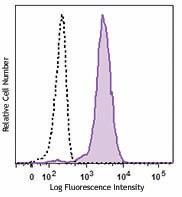
-

CD3/CD28-stimulated (3 days) human peripheral blood lymphocytes were treated with FOXP3 Fix/Perm Buffer Set and then intracellularly stained with BATF (clone 9B5A13) PE (filled histogram). Open histogram represents staining with non-stimulated cells.
| Cat # | Size | Price | Quantity Check Availability | Save | ||
|---|---|---|---|---|---|---|
| 654803 | 25 tests | 123€ | ||||
| 654804 | 100 tests | 308€ | ||||
BATF is a basic leucine zipper transcription factor belonging to the ATF superfamily. BATF forms heterodimers with Jun proteins, which in turn binds to AP-1 consensus sites. The BATF/Jun heterodimers have significantly reduced transcriptional activity compared to Fos/Jun heterodimers. Therefore, induction of BATF expression suppresses AP-1 target genes by competing for Fos/Jun binding sequences. BATF is expressed at low levels in hematopoietic cells and can be induced in response to a variety of stimuli. BATF knockout mice show defects in cytokine expression and in the differentiation of T helper cell subsets and B cells, but not in the proliferation of lymphocytes. These findings suggest that BATF is a tissue-specific regulator for AP-1 activity and plays an essential role in the regulation of immune responses. During early EBV infection, BATF expression is induced by EBNA2 proteins, subsequently preventing infected B cells from entering apoptotic and lytic pathways. This indicates that BATF functions as a modulator to maintain latency status of virus-infected cells.
Product DetailsProduct Details
- Verified Reactivity
- Human
- Antibody Type
- Monoclonal
- Host Species
- Mouse
- Immunogen
- Full length human BATF recombinant protein.
- Formulation
- Phosphate-buffered solution, pH 7.2, containing 0.09% sodium azide and BSA (origin USA)
- Preparation
- The antibody was purified by affinity chromatography and conjugated with PE under optimal conditions.
- Concentration
- Lot-specific (to obtain lot-specific concentration and expiration, please enter the lot number in our Certificate of Analysis online tool.)
- Storage & Handling
- The antibody solution should be stored undiluted between 2°C and 8°C, and protected from prolonged exposure to light. Do not freeze.
- Application
-
ICFC - Quality tested
- Recommended Usage
-
Each lot of this antibody is quality control tested by intracellular immunofluorescent staining with flow cytometric analysis. For flow cytometric staining, the suggested use of this reagent is 5 µl per million cells in 100 µl staining volume or 5 µl per 100 µl of whole blood.
- Excitation Laser
-
Blue Laser (488 nm)
Green Laser (532 nm)/Yellow-Green Laser (561 nm)
- Product Citations
-
- RRID
-
AB_2563516 (BioLegend Cat. No. 654803)
AB_2563517 (BioLegend Cat. No. 654804)
Antigen Details
- Structure
- 14 kD protein containing a bZIP (basic-leucine zipper) domain, which mediates dimerization with Jun family members.
- Distribution
-
Nucleus. Expressed most abundantly in hematopoietic tissues.
- Function
- AP-1 transcription complexes regulate gene expression in response to various stimuli, such as cytokines, growth factors, stress, and infection. BATF belongs to the AP-1/ATF superfamily and negatively regulates AP-1 mediated transcription when it forms heterodimers with Jun proteins.
- Interaction
- Forms heterodimers with c-Jun, JunB, and JunD. Interacts with IFI35, IRF4, and IRF8 through bZIP domain.
- Cell Type
- B cells, Dendritic cells
- Biology Area
- Apoptosis/Tumor Suppressors/Cell Death, Cell Biology, Immunology, Transcription Factors
- Molecular Family
- Nuclear Markers
- Antigen References
-
1. Betz BC, et al. 2010. J. Exp. Med. 207:933.
2. Dorsey MJ, et al. 1995. Oncogene 11:2255.
3. Echlin DR, et al. 2000. Oncogene 19:1752.
4. Johansen LM, et al. 2003. J. Virol. 77:6029.
5. Schraml BU, et al. 2009. Nature 460:405.
6. Tussiwand R, et al. 2012. Nature 490:502. - Gene ID
- 10538 View all products for this Gene ID
- UniProt
- View information about BATF on UniProt.org
Related FAQs
- What type of PE do you use in your conjugates?
- We use R-PE in our conjugates.
Other Formats
View All BATF Reagents Request Custom Conjugation| Description | Clone | Applications |
|---|---|---|
| PE anti-BATF | 9B5A13 | ICFC |
Customers Also Purchased
Compare Data Across All Formats
This data display is provided for general comparisons between formats.
Your actual data may vary due to variations in samples, target cells, instruments and their settings, staining conditions, and other factors.
If you need assistance with selecting the best format contact our expert technical support team.
 Login / Register
Login / Register 









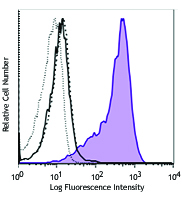
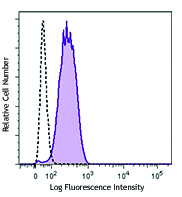
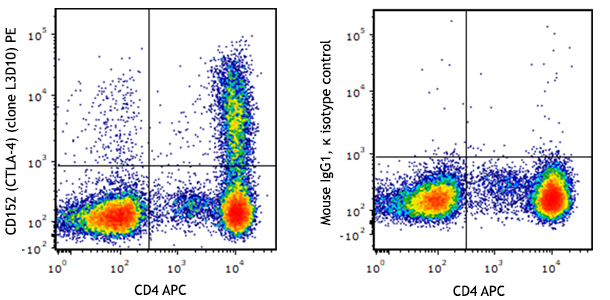
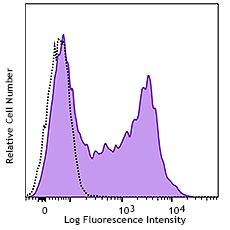
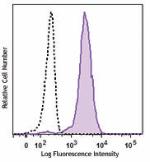



Follow Us